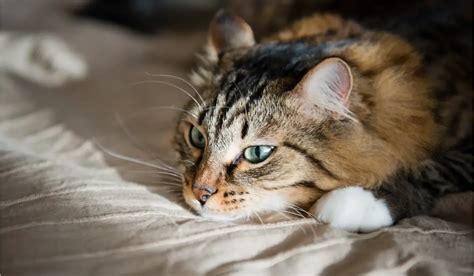Introduction

Depression is a common mental health disorder that affects millions of people worldwide. It can cause persistent sadness, loss of interest in activities, changes in appetite and sleep, and difficulty concentrating. While there are many effective treatments for depression, such as medication and therapy, pet ownership has also been shown to be beneficial for improving mental health outcomes.
Cats and Depression
Cats, in particular, have been found to have a positive impact on people with depression. Studies have shown that cat owners have lower levels of depression and anxiety than non-pet owners. Cats provide companionship, reduce stress, and encourage physical activity, all of which can be helpful for managing depression.
The Benefits of Cat Parenting for Depression
There are many benefits to cat parenting for people with depression, including:
- Reduced loneliness and isolation. Cats provide companionship and unconditional love, which can help people with depression feel less isolated and alone.
- Lowered stress levels. Spending time with cats has been shown to lower stress levels and reduce symptoms of anxiety. Pets, including cats, can provide a sense of security, love, and support.
- Increased physical activity. Cats encourage physical activity, which can help improve mood and reduce symptoms of depression. Playing with a cat, taking the cat for walks, or simply petting the cat can all help increase physical activity levels.
- Improved sleep. Cats can help improve sleep quality in people with depression. The rhythmic purring of a cat can be soothing and calming, and sleeping with a cat can provide a sense of security and comfort.
How to Get Started with Cat Parenting
If you are interested in getting a cat to help with your depression, there are a few things you should consider:
- Choose the right cat. Not all cats are created equal. Some cats are more affectionate and playful than others. Do some research to find a cat that is a good match for your personality and lifestyle.
- Be prepared to provide care. Cats require food, water, shelter, and veterinary care. Make sure you are prepared to provide all of these things before bringing a cat home.
- Give your cat time to adjust. It may take some time for your cat to adjust to your home and your family. Be patient and give your cat plenty of time to feel comfortable and secure.
Conclusion
Cat parenting can be a rewarding experience for people with depression. Cats provide companionship, reduce stress, encourage physical activity, and improve sleep. If you are considering getting a cat to help with your depression, do your research and be prepared to provide care. With a little effort, you and your cat can enjoy a long and happy life together.
FAQs
-
Can cats help with anxiety as well as depression?
Yes, cats have been shown to have a positive impact on people with anxiety as well. -
Do all cats have a positive impact on people with depression?
No, not all cats are created equal. Some cats are more affectionate and playful than others. Do some research to find a cat that is a good match for your personality and lifestyle. -
How long does it take for a cat to adjust to a new home?
It can take a few days or even weeks for a cat to adjust to a new home. Be patient and give your cat plenty of time to feel comfortable and secure. -
What are the best breeds of cats for people with depression?
There is no one “best” breed of cat for people with depression. However, some breeds, such as the Ragdoll, the Persian, and the Siamese, are known for being affectionate and playful. -
What are the costs associated with cat ownership?
The costs of cat ownership can vary depending on the type of cat you choose, the size of your home, and your lifestyle. However, you can expect to pay for food, water, shelter, veterinary care, and toys. -
Is cat parenting right for everyone?
Cat parenting is not right for everyone. If you are not prepared to provide care for a cat, or if you are not sure if a cat is a good match for your personality and lifestyle, then cat parenting may not be right for you.
Reviews
- “My cat has helped me so much with my depression. He provides me with companionship, reduces my stress levels, and encourages me to be more physically active.” – Sarah J.
- “I was hesitant to get a cat at first, but I’m so glad I did. My cat has made a huge difference in my life. He’s my best friend and I don’t know what I would do without him.” – Jessica M.
- “I’ve had cats all my life and I can honestly say that they have helped me through some of the toughest times in my life. Cats are amazing creatures and I’m so grateful for the companionship they provide.” – John S.
- “If you’re struggling with depression, I encourage you to consider getting a cat. Cats can provide so much love, support, and companionship. They can make a real difference in your life.” – Mary C.
Highlights
- Cat parenting can be a rewarding experience for people with depression.
- Cats provide companionship, reduce stress, encourage physical activity, and improve sleep.
- There is no one “best” breed of cat for people with depression, but some breeds, such as the Ragdoll, the Persian, and the Siamese, are known for being affectionate and playful.
- The costs of cat ownership can vary depending on the type of cat you choose, the size of your home, and your lifestyle.
- If you’re struggling with depression, consider getting a cat. Cats can provide so much love, support, and companionship. They can make a real difference in your life.





















